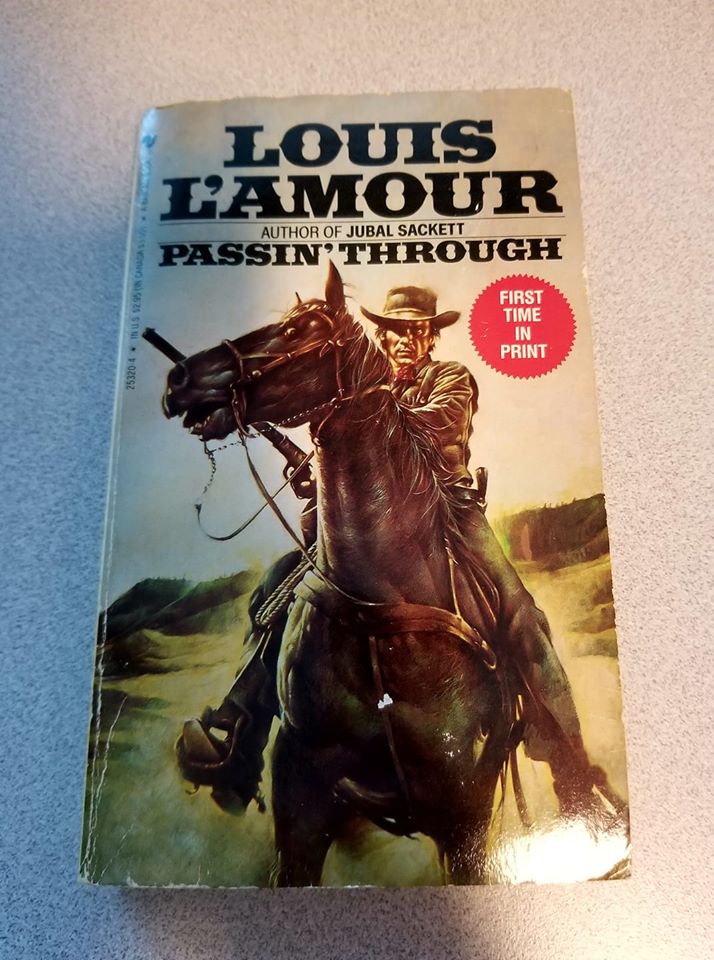That said, I've read many dozens of his books and only run into one or two I didn't really like. This one, though... this is a weird one.
The initial tone of the novel changes around 5k in and the terseness, and that strange poetic quality, disappear, replaced by L'Amour's usual voice. That's fine. More bizarre is the fact that L'Amour kept repeating pieces of information over and over - never things that bore repeating, simply thoughts or observations or pieces of characters' backstories. And the manner in which it was done read as if he'd simply forgotten he'd added this information in already. It made for some weird reading to find essentially the same exact passages multiple times in the novel.
The worst problem with the book, however, is the plot.
There are three separate plots going on at once: a revenge plot, an attempt at a mystery (it's a really bad attempt; a child wouldn't be fooled by the things the main character is fooled by), and a "let's steal the ranch!" plot.
None are enough to carry a novel-length work on its own, but together they simply don't mesh.
The main character (dubbed "Passin' Through" when he's asked his name and says "It doesn't matter, ma'am. I'm just passin' through.") is lynched for a self-defense killing, but escapes with the help of an Indian woman and her son. The family of the man he killed (who was trying to kill Passin for fun, something he apparently did quite a lot of) still wants their revenge, so Passin' flees the area.
This leads him to a ranch occupied by two women, both city folk, neither of whom know a thing about ranching. It seems the older of the two inherited the ranch without knowing what ranching even was. Local thugs want to take the ranch, their ringleader believing it rightfully belongs to him and makes multiple attacks against the ranch, trying to drive out the women (and kill Passin').
Into this comes a third plot, about a young woman who has a legal claim on the land, as her uncle owned half of it and half was deeded to her. He uncle was killed under strange circumstances (they really aren't; the mystery is painfully obvious) and is being swindled by a confidence man, slash card shark, slash hired killer who supposedly wants to help her get the ranch back - a killer whom Passin' has had dealings with in the past.
In the end, none of these plots are resolved, really, except the last. The first plot is basically tossed out the window pretty soon after the novel begins and the second and third take over until the last fifteen or twenty pages when the revenge posse show up, chase Passin' into the hills and have a shoot out. They believe they've killed him, take his horse and gear, and he passes out trying to get back to civilization on his own.
He wakes up to find that plots B and C have been resolved without him by a Pinkerton agent (who we see sporadically throughout the novel, sniffing around). In the end, he marries the girl from plot C and ceases to be "just passin' through."
All that said, there are things to enjoy in this book. Some of the interactions between characters are quite enjoyable and some of the fight scenes pretty decent. I could do with a lot less of Passin' Through laying in various places bleeding though (there's a bizarre amount of that).
It's not a terrible novel, but it's not very good, either, and of the close to fifty L'Amour novels I've read, it's definitely the weakest. I hate to say it, but the bizarre mess of this book, and the fact that it was published when he was at quite an advanced age, honestly makes me wonder if someone else slapped this together from bits and pieces of his work and simply had him affix his seal to it, so to speak, or if L'Amour himself was slipping somewhat in his final years.


 RSS Feed
RSS Feed